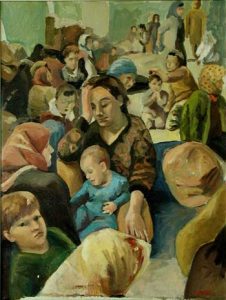populationcontrol
Population control became a topic after 1800, when it was realized that the growing life expectancy and reduced child mortality would lead to an unprecedented increase in numbers of people, while the resources and space to sustain them could not be indefinitely increased.
At this moment, about two hundred years later, the situation is becoming more and more critical. Although food production was increased dramatically in the Western world by modern intensive agriculture and mass production of meat, poultry and dairy products, there has been continued undernourishment in many parts of the world, and famines have not disappeared. Also, concern has arisen about the quality of food as well as the dietary habits in the affluent part of the world. More dramatical, however, is the water situation, oil and gas depletion, the number of megacities (with more than 10 million inhabitants) increasing from 1 (New York) in 1975 tot 25 in 2000, many of them having more than 20 million inhabitants. Population numbers are a main cause of the environmental problem, congestion of traffic, lack of space, as well as social unrest, blighted lives, inadequate housing, health care and education.
Population control and political measures
China has already come to the point where political measures have had to be taken to bring down, or rather reduce the growth, of its population, which is now almost a billion and a half. Politics is the last place where population control should be decided. It is much better to start from the bottom up, to inform en enlighten and educate people so that they can make their own choice for freedom instead of being forced into a social mould. What is so deplorable about the Chinese way is that the old sexual system of male and female and the family as well as the restricted sexual life has been continued, while only the number of children for each family has been limited to one. This is characteristic of the impotency of politics. On can hardly blame the Chinese government for such a drastic and indiscriminate, policy (which is not strictly applied). For the reduction of population was imperative, and even so the remaining numbers are enormous. What happens when all these people and their children (in reality there are more children born than the permitted one per family) replace their bikes by scooters and those by cars? Will they emulate the west by creating a modern and highly developed society with the same energy needs? Probably they will try, but possibly they will not succeed, because the weight of overwhelming numbers will frustrate them. Not only within China, but from the rest of the world, where others have the same needs and not enough resources to satisfy them. Pressure will mount over the coming 50 years. If no change takes place, millions of people will suffer and die as a result of the continued obedience to our procreative urge, our most primitive drive.
Population control and social movement

Population control and the emancipation of girls
The time has now come to emancipate girls from the shackles of the sexual system in which they are caught. We will have to show that it is to a girl’s advantage to liberate herself from pregnancy. Not just for herself, but for the sake of the rights of unborn children. More and more girls are going to ask themselves if they really want to be like their mother, if they really must bring children of their own into the world. They will ask themselves more and more daringly what it is they want, and also what the potential child might want. She will realize that the best thing for anyone is to be born with no inherited illness, for instance, and have a good home and social environment for growing up in. Obviously this idea is meeting with strong resistance. In fact, the reaction against these sexual reform ideas has already set in. Propaganda for pregnancy and the family is very strong in the western world. Meet the happy royal couples and follow their example! This reactionary trend is inspired by worries about population decline among white people (a typical biological-racist motive), fear of sexual freedom (which it perversely blames for sexual ignorance and misery) and a sense of insecurity in a world of televised danger, terror and the threat to existing power. No wonder that it is the conservative and right-wing political ideas that are now dominant, even in parties that consider themselves rational or even left-wing.
Population control and the sexual system
The near future looks bleak, because of the spiral of violence upon which humanity has once again embarked -due to its natural qualities, not its human qualities. It will bring great destruction and suffering in the short term. But after the wars of all against all, a new phase will set in, when a new generation will realize the possibilities of breaking out of the sexual mould, when reproductive technology will flourish, and the world’s population can begin to be controlled on the basis of health, happiness, the true emancipation of females, as well as the improvement of human qualities.
Watch Video The Taboo Overpopulation? Click here

